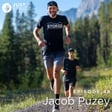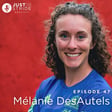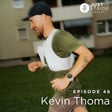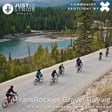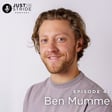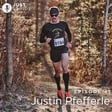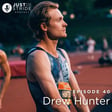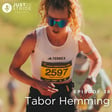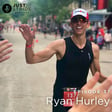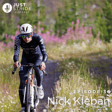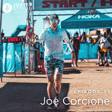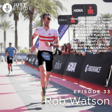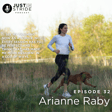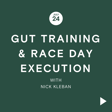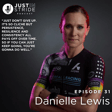Introduction and Endurance Sports Focus
00:00:06
Speaker
Hello and welcome to the Justin's Drive Podcast. I'm your host, Justin Puleze. If you love endurance sports, you've definitely come to the right place. On this show, we'll talk to athletes, coaches, and professionals who can help us reach our true potential. Being a student of distance running for over 10 years and interviewing people in the sport for the last five, I've learned a ton, but there's always more to discover.
00:00:29
Speaker
Everyone has a story, and I know you'll resonate with each of our guests as we embark on this new journey together. Join us at home, on the road, or while you run. Together we'll have some fun. So follow along on Instagram at justinstridepod and your favorite podcast platform and prepare to be inspired. Come along for the ride with Justin Stride.
Sponsor Promotion: Exact Nutrition
00:00:53
Speaker
This episode is presented by our friends at Exact Nutrition, a tasty and healthy way for you to fuel your body before, during, and after a solid training session. I can't leave the house without a few fruit bars in my pocket and they never make it back home. Exact is offering you 50% off your order when you use the code Justinstride. So head to exactnutrition.com and fuel your goals today.
Guest Introduction: Ben Pupjoy's Marathon Journey
00:01:16
Speaker
Have you ever wanted to stop everything in your life and do something that you're truly passionate about?
00:01:21
Speaker
What if money wasn't an issue and you had an abundance of time on your hands? What would you accomplish or set out to do? Maybe life looks different through that lens than it does at this very moment. Sometimes it's good to reflect on what we really want out of life and create a vision for how we plan on getting there. On this episode of Justin Stride, we travel the world on foot with marathoner, explorer, and documentarian Ben Pupjoy.
00:01:45
Speaker
Ben's story is one of health, adventure, and discovery. Once morbidly obese, he used movement and healthier eating habits to shed the weight and ultimately change his life. He won't wow you with his race splits. However, last year alone, he completed more marathons than you'll likely do in your entire life. That's right. Ben quit his steady job, gathered whatever funds he had, and traveled to 70 countries while completing 242 marathons in the process.
00:02:14
Speaker
He was on a self-supported mission to see the world, experience new cultures on his own two feet, and he's here to share the journey with us all. Hey Ben, welcome to the Justin Stryde podcast. I'm so grateful you accepted my invitation.
Journey from Obesity to Marathon Success
00:02:29
Speaker
Justin, thank you for having me. This is a podcast about endurance sports, you know, and you've just completed a feat that
00:02:40
Speaker
is out of this world, an exploration, a discovery of the world on foot, 242 marathons completed. I mean, have you come off that cloud yet?
00:02:53
Speaker
Yes, I have come off that cloud. So my project, which I dedicated the full calendar year two in 2023 was an attempt to do as many freestyle marathons as I could across as many different countries as I could afford to do as this was a DIY self-funded project. So the good thing about my project is that it had a hard stop.
00:03:18
Speaker
And it was an incredible privilege to travel so much of the world this past year and explore it intimately. And I can't mourn it having ended because it was such a gift. So now I am quickly transitioning into real adult life because I need to get a job. So what was the why behind it for you?
00:03:40
Speaker
Yeah, I think the why it's a, it's a big question and take some unpacking, but for me personally, I always grew up quite modest in terms of like my natural abilities. I always joke like I'm an atheist. I have no God
Lifestyle Transformation and Weight Loss
00:03:54
Speaker
given abilities had immigrant parents from England. My dad was into rugby, which just kind of didn't exist here in Canada. So I kind of played like some rec league sports had real meat and potatoes parents accidentally scored one goal and rec league hockey.
00:04:10
Speaker
was on the cross country running team where I had mediocre results. And then, you know, two decades later, kind of found myself morbidly obese, desk bound, eating takeout pizza, working long hours. And by luck, I had been headhunted and brought to a job in Toronto. It was kind of the first time I experienced this generational shift where I showed up as like this human dumpster fire in this new office full of young people.
00:04:38
Speaker
who didn't get drinks after work. They were going to Pilates and spin and yoga. And I was like, Oh my God, I am disgusting. I got a change. So I slowly started walking in 2015. Um, because I was too embarrassed to go to the gym, just so out of shape. I don't even know how to use gym equipment. I still don't. And that kind of segwayed into this, like.
00:05:00
Speaker
forest gumtail where I never stopped and have been inspired to keep going and going over many years. I've since done 75,000 kilometers, or at least nearly across six continents, um, which is 840 ish freestyle marathons.
00:05:20
Speaker
And the genesis for this most recent project, which is called the marathon earth challenge really was just having our world upended by the pandemic. The world has always been my muse. I love being outside. I always kind of speak about how I think like the real world is the best movie ever made. It's this like.
00:05:36
Speaker
smooshing of all genres or it's like this comedy horror romance movie and I just really wanted to bet all chips on myself take a huge gamble and do this massive project last year so that's kind of setting the stage and then you can take from that whatever you will. Yeah so like growing up were you like you mentioned you were kind of into sports too but were you a bigger kid growing up was there the weight issue that you faced later maybe later in life was it
00:06:05
Speaker
you know gradual just increase over time or you know how did that kind of all look?
00:06:10
Speaker
Yeah, I think just for context, like I was born in, uh, at the start of the eighties. So just kind of like a pretty
Sustaining Motivation and Joy in Endurance Sports
00:06:16
Speaker
regular eighties suburban kid, um, played road hockey, rode the bike. So I was like doughy, but not, uh, overweight. It wasn't when I got to university university, I just didn't really enjoy it. I was really grateful for the privilege. It was an opportunity my parents never had. And I really love like academia, but I also like doing. And so when I got to academia.
00:06:39
Speaker
It was just straight ideas with like no real application. And I felt really lost in it. And I started like emotionally eating, I think at that time, just out of confusion for what I was doing. And then that expedited becoming obese. So I'm five foot 11, I kind of have like slender shoulders. And the last time I had like got on the scales at that period of my life, like I was at two 50, so I could have been heavier. So.
00:07:07
Speaker
Yeah, but I accept all responsibility for, you know, my bad lifestyle decisions. And at one point the body starts telling you, you've got to kind of turn it around, you know, start getting the signal. So you become more responsible. For sure. And so was there like, you mentioned going to a workplace where everyone was active and maybe
00:07:27
Speaker
maybe triggered you a bit. Was there a day where you're like, no more? Because it's part of your habit, part of the lifestyle, exercise and eating right and all this stuff. Not always easy to implement also, or to see the end of the tunnel, you could say.
00:07:49
Speaker
How did you take the steps to then create a better life for yourself, putting you in a position, because you don't look like that now, to put you in a position to do what you did last year?
00:08:02
Speaker
Um, yeah, I guess I should preface everything with like, I was living in Montreal, which is like the Berlin of North America. Any night is like Friday night. So you can be Peter Pan forever. And then when I came back to Toronto, you're from Montreal. Yeah. Best city in the world. If you can exhibit discipline or city in the world, if you have no discipline. So.
00:08:23
Speaker
Prior to moving, like I started to get like kidney stones, which was just the byproduct of like too much soda, too much coffee, being obese, had to go to ER like a few times. So I did, I don't know if I hit rock bottom, but I was like, okay, like I'm starting to get signs that, you know, this lifestyle is like terrible. And I just so happened to hear this podcast, um, by a biomechanist named Katie Bowman, who, uh, has since become like a friend and mentor and a collaborator.
00:08:53
Speaker
And her argument is just essentially to get people moving in any way and to stack our lives with as much movement as possible. Um, because that's sort of how we've always kind of been, you know, like the hunter gatherer and I'm not some like naturalist, like rewilding type of person, but I heard her argument and it just transcended like diet. And what I knew was like exercise and was so.
00:09:21
Speaker
shockingly sobering in why we need to move, that I was like, okay, I just got to start walking. I got to do anything. That really was just how I started. Would you say that the diet is what helped you the most or the movement?
00:09:39
Speaker
embarrassingly, I have been vegan since my teens because I was raised in the punk rock scene. And I kind of arrived at being vegan for like ecological reasons, just wanted to live a bit lighter. Like I've always had dogs in my family. I love dogs, but I'm not like,
Gamifying Fitness and Plant-Based Diet
00:09:55
Speaker
i love animals but i'm not like an animal guy you know so shockingly i've always had the underpinnings of a good diet but as anyone knows like you can be vegan and eat french fries and sodas so i did have
00:10:08
Speaker
you know, a good base to work from. But the only money I invested very early on was working with my friend, Danielle Levy from Montreal, who was like a nutritionist. And I just got her to like audit my diet. And she just made a bunch of like really simple suggestions where she was like, Oh, if you like mashed potatoes, why not swap that out for like mashed butternut squash. And so I just made like all these little tweaks as well as obviously would like some caloric
00:10:34
Speaker
restriction and the weight would come off. And I guess my only advice to people out there who maybe want to lose weight is like, I felt like everything lined up at the perfect time with like technology, like using apps, be it
00:10:48
Speaker
um, you know, kind of like food monitoring apps or, um, tracking apps for your physical movement. And to me, they were really helpful in showing me results in terms of data before I could see it in the mirror, because I had tried to previously get healthy, but I would give up after two or three weeks when I couldn't see results. And when you use.
00:11:10
Speaker
you know, trackers, like it's quite silly, but you're like, Oh, I've gone a little further this week. I've gone a little faster. And that actually like can fool you with a lot of hope and the absence of seeing that in the mirror. So those were, you know, scraping together a couple hundred bucks to see a nutritionist who can provide you with a real inputs was super helpful. Like I just wasn't raised in a household that knew much about food. All due respect to my parents, there's meat and potato people.
00:11:37
Speaker
And then using technology to gamify things I find is incredibly powerful. Yeah, and that's using those tools in a really positive way too. Such a small world. I know Danielle as well. I met her in Montreal. I actually interviewed her a few years back on an old podcast, but it's pretty cool. So good plug for Danielle. She's great.
00:12:01
Speaker
an amazing human being. And if anyone has any doubt in her abilities, she has explosive energy in a tiny frame, and is timeless. She does not age. So she is a testament to what she knows. Yeah, so the game of flying of the of this pursuit, you could see results. But when did you actually see the results, you know, because a lot of people they try
00:12:27
Speaker
to actively lose weight or to get fit, but it takes some time. You know, it doesn't always happen right away. Yeah. So in 2015, I approximately lost a hundred pounds over eight months between early January to early August. And while I had never received like medical guidance or help, like I kind of just looked around online and they were like, try and lose no less than like two pounds a week, just as, you know, you don't want to lose like too much.
00:12:57
Speaker
And I think like what my big hack was, was like originally I started walking, which, you know, obviously segued into jogging and doing like longer things, but I just really enjoyed it going out in the world, like what the world revealed to me. And I think what's like really important is if your form of exercise, like isn't fundamentally like joyful or meaningful to you, it's never going to be sustainable.
00:13:21
Speaker
So, you know, we're obviously talking with a lens on the endurance sports space, but your form of exercise could be
Marathon Project: Logistics and Impact
00:13:28
Speaker
Tai Chi. It could be dancing. Like if it's fun to you, that will make it sustainable. So don't necessarily follow what other people tell you to do. Do something that you love and you'll look forward to doing it as opposed to just being like, Oh no, it's gym day or Oh no, it's sprint day. You know? So I found that very helpful as well as.
00:13:47
Speaker
um I think one thing that's uncomfortable for a lot of people to talk about in terms of like fitness is like it's largely um
00:13:58
Speaker
self-serving and selfish, right? Like these are pursuits that like better us. And that dawned on me very quickly as I was buying like dry fit gear and blazing through shoes. And so what I tried to do when I was like losing weight was like, I'd actually make just like peanut butter sandwiches in my kitchen at home. And I would like distribute them to people on the streets who were like in need, like it was just like real.
00:14:20
Speaker
ironic that I'm trying to like lose weight as I'm walking by people who are hungry and I'm wearing clothes that are trying to shed heat when people are like freezing out there. So sometimes when you do these little hacks to convert your physical movement into social movement, that actually can function as a mechanism that gets you to go outdoors. Like there were some times when it was like raining or snowing.
00:14:41
Speaker
were cold and I was sore. And I was like, you know what, those people are still out there. It's like, that's real hardship and tenacity. And that helped externalize like my fitness journey, like beyond me. So between like, maybe it's a little fundraiser, maybe it's just giving out gloves that you get from a dollar store, gamifying it. There's like a lot of little like ingenious little hacks that people can do to make their pursuit as sustainable as possible, because that's what it's all about. Like,
00:15:08
Speaker
Getting to a baseline of health is like quite easy, right? Like you can lose the weight, but it is embracing that as a consistent lifestyle. That is like the real challenge because we just exist in a world where there's so much temptations. And like, I have a ripping sweet tooth to this day. You know what I mean? And you got to reward yourself, but you have to implement like systems or processes that are sustainable. If not, you'll just deal with the agony of yo-yoing.
00:15:36
Speaker
Where does this gamification come from for you? You mentioned it a few times now that that's fun for you. Now you're using it to give to others also as part of your journey, which is
00:15:51
Speaker
which is selfless. Is there an interest in gamifying stuff? I'm sensing some creativity around there. I know you're a documentarian as well.
00:16:07
Speaker
For me, I probably have my brain microwaved sitting in front of the Nintendo Entertainment System for countless hours over the 80s. So I somehow see like gameplay and game mechanics in like real life. And I think like that's what really attracted me to like apps, you know, like the tracking apps. Like I'm like, oh, data, pace, elevation, climb, calories burned, like
00:16:31
Speaker
that was all really like interesting and felt like play. And I think that like when exercise feels like play and not work, like that's the kind of key to making it like sustainable. And then on top of that, like I've now arrived at a place where humbly I know I'm a world-class adventurer. Like I've gone to the ends of the earth solo and unsupported doing marathon length tracks and some of the most trying conditions imaginable.
00:17:00
Speaker
And the reason I do that is because, you know, these freestyle marathons I do are like these mediums for me to document the world where I go on these tracks, but I also aim my pen and my camera at the world to kind of like tell stories. And so I've essentially tried to stack my physical movement with as many ulterior motives as possible. So like gamifying it.
00:17:24
Speaker
adding social purpose and using it as like a storytelling vehicle. And when there's like all these kinds of like fun bells and whistles attached to it, it becomes so attractive that you can't imagine life without it. You know, versus if it was just some terrible grind that I hated, I don't think I would have been able to maintain this lifestyle over the last year decade. Yeah. On a simple level. It's like people would do that all, all the time, maybe not in the same way, but to get their runs in or
00:17:52
Speaker
or walking in, they'll go walk to the grocery store or they'll walk to work and walk back or bike somewhere, you know, any way you can kind of find movement, but as a way of transportation, let's say, or on a simpler level. But that's, that's amazing. What's your favorite vegan meal? I'm also vegan, so I'm kind of interested about that.
00:18:09
Speaker
Oh, I mean, like, um, I guess, I think I love Middle Eastern food the most. Like, despite having, you know, I probably said another world record for dude who's eaten the most hummus in his life. Like, I will never tire of hummus and it makes like no sense. So I'm like, you give me a big,
00:18:28
Speaker
Middle Eastern plate with like falafel hummus rice. Um, I love that. So that's my go-to, but you know, Toronto, I will say has like an amazing Caribbean food scene. So the rotis here and doubles, which are like fried doughy fritters filled with like curry chana or chickpeas. It's amazing too. So that's mine.
00:18:49
Speaker
Yeah, I know. Good food in both our cities, I can say. I'm not in Montreal anymore. I'm in Switzerland, but. Where are you in Switzerland? I love Switzerland. I'm in Zurich right now. I was there last year. I wish I knew. Yeah. One year too late, but maybe next time. Yeah, in Zurich now. And yeah, it's also, you know, it has culture and good food too. And, you know, people, you know, immigrate here, of course, from different countries. So you have access to those types of food too. But Montreal, I can't, you know,
00:19:19
Speaker
We're just spoiled there, I think. Absolutely. So what did it feel like to be in your new body, in your new life? And did that spur some new ideas for you once you gained this fitness?
00:19:34
Speaker
Yeah, there was like one moment I can like specifically remember where I had like an oh wow moment. I was like Jay walking across the street in Toronto when the light was changing and I was in the wrong and cars were approaching. So I sprinted across the intersection and I felt so light in my body and floating on my feet.
00:19:57
Speaker
And it is a feeling like, I don't know if I've ever had like, I can't even say I can recall it. And it was like an emotional moment for a second. Like I was like, wow, I've kind of like arrived, you know? So that was great. And then I've always had like an interest in like boxing. And like interestingly, I think like boxing has taught me everything I needed to know about insurance sports because boxing is all,
00:20:23
Speaker
managing the sensation of pain when you're getting clobbered sparring, as well as breathing and staying relaxed. And so to then in that moment, a few months later, I had like one of like George St. Pierre's coaches like learn about me and he took pity on me and he started like training me. And so to then be able to kind of like box
00:20:44
Speaker
was incredible because I had gone from literally a couch potato fan to being able to kind of like be taught by incredible trainers and go to gyms around the world and those are gifts and like the the funny thing is like physically I don't know if I feel any better today than I did when I was obese there's just different aches and pains and that's also because what I do now is extreme
00:21:05
Speaker
But movement opens up your world beyond your wildest imaginations. Taking that first step is always scary, but the momentum it provides is incredibly magical. So how did the movement evolve for you then? How did you get to these marathon projects that you call marathon projects? Was that more gradual? Or some people, once they get a taste, they jump to bigger distances.
Cultural Insights and Human Connections from Travel
00:21:34
Speaker
Yeah, I think if there's one thing I've learned from my experience that if you go slow and be patient, you can actually go far. So I've actually just like dialed up the intensity of what I've done over many years. So at first I just started kind of like, you know, walking around, these became longer and.
00:21:52
Speaker
I really enjoyed being out in the world running errands and just kind of like documenting things. And then it got to this point where I was like, this interest of mine was like very all consuming, very like weird. And I was finding it increasingly hard to justify to people in my life. So I discovered, I was like, if you do a marathon distance,
00:22:11
Speaker
That is something that the world like broadly applauds. And to me, it's just a measurement that is a justification for me to be out in the world wondering. So then, as like, instead of being this weirdo wanderer, I'll just like redefine myself as like a marathoner. And people seem to applaud that. So the last few years, like I just started doing hundreds and hundreds of these marathons. And when I had time,
00:22:35
Speaker
for vacations outside of work, I was like, Oh, how would this look as a project, you know, going away for a weekend and trying to do, you know, these freestyle marathons in the middle East or Iceland or Australia. And then you just end up becoming like a crazy person. And so I would just do these test and learn projects where I did like five ultras and five days across Australia and New Zealand. When I turned 40, I use my 40th birthday as like an excuse to kind of do that project.
00:23:05
Speaker
and then oh no I just did that project for the hell of it when I turned 40 I did nine marathons and nine days in nine different countries so I'd always just done these projects and then you know I just reached the point where I was like I had had a pretty like lucrative job you know that said I
00:23:25
Speaker
don't own a home, I don't have kids, I don't own a car, I have no assets. And I was like, if I were to do like a sabbatical, take a year off, could I really like test this long distance skill set that I've discovered? And so that was kind of the rationale behind doing the marathon of challenge last year.
00:23:40
Speaker
And so when you say going slow, you are walking most of these marathons just to preface it, right? Yeah. So they're like pretty walks, like pretty quick pace. Um, like for the project last year, because I was self-funded, like I had like no road crew, no support staff. So everything I needed for the year had to be like strapped to my back.
00:24:00
Speaker
So, um, kind of like a 30 pound bag. So because of that, like it's inherently already kind of crunchy on the hip. So quite a fast pace, sometimes kind of joggy, but overall like a real fast walk pace, especially as like.
00:24:16
Speaker
Um, much of the world is not as flat and asphalted if that's even a word as my hometown of Toronto is. So, you know, elevation climb is crazy. A lot of places in the world, like don't even have sidewalks, just kind of crumbly, or you're on the edge of a road where cars are brushing up against you. So sometimes the pace for me is like slower than I want to go because risk and danger were the complete enemy of my project last year. So like a twisted ankle could have been.
00:24:46
Speaker
game changer in the worst way. So yeah, going slow to go far. For me, I totally get why people have a desire for pace and speed, right? Like that's like really fun. And I love that. I applaud that. You know, good friends with
00:25:05
Speaker
Jessica Cullen and Mark Cullen who are like two of the most like psychopathic iron men iron women in Canada and like I love that they're like these complete like beasts where for me like I'm just really motivated for like aggregate distance and length and that's merely because like I love the world even though our world is screwed up so I want to be out there moving through it as far away from home as much as I possibly can and and
00:25:35
Speaker
It takes, you know, you're going slower paces, so it's taking more time. So where do you, you know, people say all the time, how am I going to find the time to move or, you know, how do you find the time to do these marathons? Like obviously when you took a year off to do it, you had the time to do it, but just like more so in everyday life, how do you balance that in your life with work and all that? Yeah. So I guess.
00:26:02
Speaker
I kind of always try and get like a marathon done within around like six hours, but I'm not one of those people that's like precious about like stocking their tracker. Like I see other runners, they get to read, like positive tracker. And so if I see something funny and I have a camera, like the trackers is running, I'm taking photos or I take notes. So I think like my.
00:26:22
Speaker
true times are worse than they actually are. But in terms of like finding time, you know, the reality is until they add another hour to the day or another day to the week, like there's just never enough time. And so my pushback to everyone is really like, how do you use your time? Because I think like 24 hours in a day is there's a lot of time, right? If you
00:26:46
Speaker
kind of imagine that it's eight days of working or eight hours of working, give or take eight hours of sleeping, give or take like they're then in theory is eight hours of leisure or free time. And obviously these numbers can adjust. So for me,
00:27:01
Speaker
I just really kind of like did a real assessment of like my lifestyle and like what mattered. And so that could sometimes mean getting up like super early or just doing this stuff like after work at the expense of going to bars. I'm not a big drinker or like endlessly watching Netflix. And there's nothing wrong with that. I just found that I derived more entertainment moving than I did through what I would call like passive relaxation. So.
00:27:29
Speaker
there's never time you just have to make the time that's the honest truth yeah it's just the time allocation like you're saying
00:27:35
Speaker
You know, how much time, you know, your phone reminds you how much time you spend on it every week. Yeah. I was also like in quite a fortunate position, like professionally for the last few decades, I was like an executive creative director at a marketing industry. And essentially like my job was to come up with ideas and the most reached, most recent agency that I worked at, which I'd worked at for nearly like a decade. They knew I was a complete like weirdo oddball. And so my process entailed.
00:28:04
Speaker
just coming up with ideas, that's what I was on the hook for. And I find that just moving and flowing is just conducive to this meditative state of just thinking. And so I don't want to give the impression that I never showed up to work, but I would just sometimes arrive to work a little late because I'd been trekking or leave a little early. And the workplace for me was just where I would transcribe the ideas that I had baked into my mind, onto a computer.
00:28:31
Speaker
So sometimes it's about, you know, blending what work and leisure can become. Like if you can get away with that, which I recognize is something that can be difficult for some people, depending on their jobs. For sure. Um, so let's talk about, um, you know, the logistics behind a project like this, how much planning did you put into it?
00:28:57
Speaker
You mentioned freestyle marathons in terms of, I'm assuming that means in terms of routes and where you were going to go in every place. But did you kind of like have an idea which direction you wanted to go in? Because you covered like 70 countries. So I know visas are probably a thing and all kinds of rules and regulations and all that kind of stuff.
00:29:20
Speaker
Yeah. So the backstory on the project was that the start of 2022, I was on like a virtual town hall with my work. And there was like this final slide where it was like the company applauding like my eight year anniversary with them. And I knew it had been a while, but like I didn't realize I'd been that long. So all I saw was the number eight, which looked like an infinity sign.
00:29:41
Speaker
And I was like, oh my God, I need to change. So I put my job the next day, which my wife was somehow fine with. My wife is a completely normal, well-adjusted adult. And my boss, God bless him, who's always been a massive supporter of me, was completely blindsided by my announcement to leave a job that was lucrative, had ultimate stability. I was literally in the rung of the leadership.
Family Support and Project Logistics
00:30:09
Speaker
And he called me up and he was like, where are you going? Like, we'll match the offer. And I was like, Oh, dude, I'm gone. I'm doing this project. And literally his tears turned to laughter. Cause he was like, this guy is so crazy. You can't.
00:30:21
Speaker
rationalize with a crazy person. So hilariously, like my contract had never been updated and I only owed them like a month's time. And they were like, can you give us eight months time to stick around and transition? Of course. So that took me to August, 2022. And so between August, 2022 and December, 2022, I approximately had five months to organize all the logistics associated with my project.
00:30:43
Speaker
For me, I had a functional budget of 50,000 Canadian dollars, which is a big chunk of money, but once again, put like all my chips into this project, sold all my possessions. And in the five months prior, I pretty much did the lion's share of all the work associated with that. So there was like some major buckets.
00:31:02
Speaker
One was communications, like project needs a website, it needs copy around it, so I did that. Others was logistics itself, which was quite complex. That was studying global weather patterns, visas, macro trends in terms of places, like what are places that are susceptible to terrorism, more environmental collapse.
00:31:25
Speaker
And then the third bucket was just getting a PR team on board to help tell the story. I've been pretty clear about this project where I did this project to take a gamble to hopefully parlay it into something else, which is not necessarily sponsorships in this space, but a job because I don't have the wherewithal to be a full-time adventurer.
00:31:49
Speaker
So yeah, the project overall was like quite complex. There was 75 different flights to nearly 70 countries, five boat rides, almost 140,000 kilometers flown 240 nights abroad and very, very modest accommodations and 50 nights like crowd surfing. And then in the day to day.
00:32:12
Speaker
Basically, you have to be aware of kind of like the macro trends out in the world, like how that society perceives your ethnicity, your sexuality, your faith. And so you have to kind of act accordingly. And then furthermore, when you get to an individual place, like you need to know the trustworthiness of like the police and the military, if there's checkpoints, criminality, what type of scams, and if there's certain no-go zones, be that, you know,
00:32:40
Speaker
areas where there's kind of open hostilities or just where people are known to get robbed. And I would kind of route around that. So what I would try and do is stitch together these freestyle routes through streets and back alleys and coast and trails to hit like major attractions. But I'm also keen to see all like the in-between because I think like that's where you really experience place, right? Like
00:33:06
Speaker
It's cool to see the Courbazier pavilion in Zurich, but the fun stuff is like what happens when you're cruising around the lake and you see all the people swimming. So for me, I love those big ticket fun attractions, but I love the little like side streets and the local neighborhoods. So that was like the project, like logistically, like there was a big layer of the organizing and then there's a
00:33:31
Speaker
daily layer of studying maps and creating routes that let you see a place but not put yourself with danger. And I'm just thinking about like, you made this, this cut, you know, like from working eight years somewhere to then wanting to take on this project, like, were you unhappy at work?
00:33:52
Speaker
No, I was not unhappy. I've always kind of been a fan of independent culture and underground scenes. I like weirdo artists and weirdo writers and punk music. And I felt like for eight years, I was like, oh, what does it feel like to be mainstream and contribute to the world? And so I kind of did that and got my fill.
00:34:15
Speaker
And in my industry, you know, it is quite a like complex industry in advertising and marketing. There was like a lot of hands in projects and I was always like punk and like DIY. And I found like I was like doing these big projects and I was like, I couldn't even tell what I was contributing anymore. Cause you have like writers and art directors. And I was like, just want to do this wild adventure where it's just like binary. It's either going to be a success or failure. I mean, they're going to like pull off all these marathons.
00:34:40
Speaker
and be entirely responsible for all the creative storytelling myself, be it in words and photographs. So last year I published like 230,000 words in my newsletter, which is equivalent to writing a 900 page trade paperback, like while doing almost five marathons a week. And so for me, it just felt like a return to form of like just being a maker and a doer after like, I just kind of got bored with like bureaucracy and
00:35:08
Speaker
analysis paralysis and death by committee. My wife is an editor at a newspaper and they put out full newspaper every single day. That is insane. That is so much content. It's so much organizing. I always joke, if an advertising and marketing agency was responsible for newspaper, it would cost like $40 trillion and you'd maybe get one issue a year.
00:35:30
Speaker
I wasn't unhappy. I just like wanted to do more and see more and just return to more like a pure state of being like a doer, maker, and adventurer because that's what I was before. And what did the people around you say? What did your wife say?
00:35:45
Speaker
Well, it was funny. When I told my wife my plan, she'd obviously met me years into knowing that I had like, you know, I was doing these kind of freestyle marathons and would kind of like use my money to travel abroad. And so when I told her my plan as a newspaper editor, she was like, I think this is incredibly newsworthy idea. And I love it. But she's like, at your wife, as your wife, she's like,
00:36:11
Speaker
This strikes me a different way. So my wife, Christine was like 100% supportive from the get-go, as was like everyone in my inner circle, which I was really surprised by. I thought.
00:36:23
Speaker
I was kind of hoping like someone would be like, you're a total moron. You're flushing your career down the toilet to go on this adventure. But everyone was like, Oh yeah, totally makes sense for the skillset you've developed and what you do. And they almost had like more belief in me than I did. And that was kind of like very reaffirming. And then when it got down to the nitty gritty of my project, like you obviously have to negotiate project parameters with your loved ones because, um,
00:36:51
Speaker
While it was me doing this project, I was creating an absence in their lives that required them to sacrifice. So I was asking a lot from them and you obviously want to keep them engaged. So with my wife,
00:37:03
Speaker
Uh, I would fly home every quarter to see her and she would like fly out to see me every quarter. And then with my family to obviously try and talk to them as much as I could, uh, and do that safely.
Reflections on Global Marathon Experiences
00:37:14
Speaker
I call my wife 7 PM every night, her time, regardless of the time zone I was in. So I often didn't get a full night's sleep. And then I wore a GPS tracker that had a private portal that allowed my family to know my whereabouts in real time. And also has like an SOS button.
00:37:31
Speaker
Which is like great because you can touch the SOS button if you're kidnapped or hit by a car. But like it's also kind of a bit of an illusion because like I've done multiple marathon projects in Mexico and the cops always rob me there. And so I'm like, if I hit that SOS button, it's probably just going to call more cops that rob me more. So all these things are kind of provide illusory protection sometimes, but you got to do it further sometimes.
00:37:58
Speaker
Yeah, they're like, you need help? It's going to cost you. Yeah, exactly. Or they show up and they're like, what can we take of yours? Yeah, that's crazy stuff. I mean, more power to you. That's really amazing. And yeah, I don't like, I almost don't know where to start. Like, did you
00:38:16
Speaker
Did you find that creativity that you were seeking to the core of you to be able to write? I mean, you said you wrote many, many words. Do you feel like you got out of the trip what you were seeking?
00:38:28
Speaker
hundred percent like the world provides like to me to essentially like dedicate every day to wandering a new place like there were certain weeks when i was in four different countries so it was like quite like jet set and taxing there was no rest or recovery and project was like physically terrible like you're just throwing your body into the project but the payout is just like this infinite
00:38:55
Speaker
inspiration from the world, which is like our world was like f'd up and it's quirky, but it's also like so beautiful. And so there was always a story to be found and always a story to be told. And often in instances where it was just like me and one other, and it was just like such a gift, you know, like
00:39:14
Speaker
I don't know, the world just provides, like there's so much magic and serendipity. I'm not like a hippie person, but if you're out there, like incredible things happen, like versus indoors where you're inside of yourself or in the streaming platform or in the social media, like.
00:39:33
Speaker
You know, I don't really differentiate saying the physical world is the real world. Cause the real world now seems to be like this blend of like the physical and the digital and the virtual. But I just think like the physical world remains like just the raw unfiltered well of where things happen. And that's just why I like to be out there. What surprised you the most, would you say about your, your journey? I think what surprised me is.
00:40:02
Speaker
At our core, humans are more alike than we are unalike. And it felt a little disappointing when I first had this realization because like Indiana Jones, you want to go out in the world and see all this exoticism. But what you soon realize is we're 99% alike, the 1%
00:40:24
Speaker
in which we're different is maybe our ethnicity, our religion, some of our customs. And it's quite funny because no matter where you go, baby babble looks the same and kids horsing around looks the same. Old couples have a way of physically morphing to look like one another.
00:40:44
Speaker
men and women just seem to become like genderless at 80. And I found that like just so reassuring at a time when there's a lot of like signal and noise about like divisiveness that I was like, Oh, at our core, we're more alike than we are unalike. And I won't paint this project as being like fantastical. I don't think people out there are like, I'm not gonna make this argument that like, Oh, the world was so kind or
00:41:14
Speaker
Or nor be irresponsible and say like the world is a really dangerous place. I just felt like most people are really indifferent. They're just trying to like live their lives. And sometimes it's just like these sparks of serendipity that like are amazing and share with one another. And yeah, that it was just really reaffirming that like, we're more alike than we are on a life.
00:41:34
Speaker
I wish I could plug a hard cable into my brain and like upload what I've seen for the rest of the world because like I was just in awe of the natural bounty of the world like you, you know,
00:41:49
Speaker
I saw like oranges that look like watermelons growing off the trees like fields of bounty of vegetables growing in Israel and northern Portugal and in places I didn't expect like Colombia has like 15 different types of bananas I didn't know existed so you see how the earth can provide how the earth is so beautiful and just like human ingenuity explored like everywhere and
00:42:16
Speaker
For me, it's just something I'm gonna like double down where I'm like, like us humans were weirdos, the world is kind of screwed up. But it's like, it's just worth caring about, you know, and it's like, I don't know, I haven't done a great job at being able to like,
00:42:30
Speaker
tell that part of the experience on a bigger scale. But that is the one offering I hope to do a better job of moving forward. I don't know. It's easy to be hopeless in this modern day and age. But if you actually get out there into the physical world, I just felt like there were so many moments that made me feel incredibly hopeful and grateful to be where I am now. Did you have? You were always on the move.
00:42:59
Speaker
Did you have time to connect with members of community or any individuals along the way? Did people start to recognize you? Yeah, it's quite funny. I like to move off the beaten path. I'm often in places where you conventionally wouldn't find a tourist.
00:43:18
Speaker
That naturally leads to certain moments of like, wow, who's this dude? But also on the project, I look like a mix of like a maciated Santa Claus with a leprechaun with like a real like dirt bag appearance. So sometimes I think people were like,
00:43:38
Speaker
What is this guy? He's super weird. And I'll, I'm going to like close the point shortly. And then other times, like I'm moving with like a lot of purpose. I wore like a bucket hat to cover like my ears. And I actually wear like dog tags with my passport information embossed on me in case I'm like killed or murdered. So my body can be identified. So I think in certain parts of the world.
00:44:02
Speaker
I'm also like tattooed. I think I was perceived as maybe as strange as it sounds like special operations. Like people were like, Oh, this guy's moving with purpose with a lot of gear in a place that he wouldn't be. So I didn't have a lot of interactions with adults. And my asterisk to that is teens and kids love me everywhere. Cause whereas like adults are like, I don't know about this guy.
00:44:26
Speaker
There's some vibe that teens and kids pick up on. They're like, this guy's a playful like goofball. And so I had just like the most amazing interactions with like.
00:44:34
Speaker
little kids, you know, they pass you a soccer ball. Like the amount of times I'd be like in the weirdest place, a kid would just like punch me in the butt cheek for like no reason. And then you just have these moments. And then it was like quite fun because like in many places in the world, I couldn't speak their language, they couldn't speak mine. And so you're just like doing physical gestures and pantomime. And that leads to these interactions that are like fundamentally like humorous and funny, where you're like acting things out.
00:45:01
Speaker
So there was lots of moments like that. But then there was also like very specific moments. Like I met a woman named Ivana.
00:45:09
Speaker
Croatia and she had been like born under communism and lived through a civil war there experienced like independence and free market and now Croatia recently like adopting the euro which has led to like insane inflation over there and so just to like speak to these people who have had these like completely different existential experiences than myself you know I've lived in
00:45:33
Speaker
Canada for much of my life, which is like a liberal democracy that's free market.
Logistical Challenges in Worldwide Marathons
00:45:37
Speaker
It's stable. There's like all these consistencies that I've just taken for granted. And then, you know, I'd met tons of people who have been affected by war. So Ukrainians who have fled and are reimagining, um, their lives elsewhere in Mongolia. I met, um,
00:45:57
Speaker
technically a Russian guy who is part of like a Siberian ethnic subset that like essentially like was a deserter and now he's like a man with no home. And so for me, those were incredibly profound interactions because
00:46:13
Speaker
My project was hard in certain ways, but it was also like leisure. And I'm a big advocate of never making the mistake of thinking like one's leisure or kind of like physical pursuits, which are rooted in play. Like they can never have parody with like real life. So that made me like super grateful to be able to do what I was doing. Like as I was surrounded by, you know, people like truly doing hard things like life or death things, you know, so.
00:46:39
Speaker
There's a lot of small magical moments and then really like profound moments where I'm like, Oh, I understand what human tenacity is. And for me, that is greater than endurance sports space. Like these are people like just trying to live, you know, and you draw power from that a lot of inspiration from that. And like, oddly, I was kind of embarrassed to tell those people about my project and they were just like, yo, your project's dope. Like the fact that you can do that is great. I wish I could do that. And I was like,
00:47:07
Speaker
Oh, okay. Yeah, cool. I'll embrace it then, you know, like I'm lucky to do this and I'm going to try and tell everyone's story along the way. And yeah, that was the experience. It was incredible. Was it, you know, I know when you go on vacation for two weeks, you come home. It's like, you just get removed from wherever it is. You just came from, was that a challenge maybe going home for just a little, a little window and then going back into the element that you were just, you know, just in like.
00:47:36
Speaker
Were you driven to go back? And also for your wife, did she have her pick of an area or a country that she wanted to visit?
00:47:49
Speaker
Oh, yeah. So when she would come out and visit me, it's like wherever she wanted to go. My little brother was a huge a-hole during this project and had a destination wedding. So that in Q1 put us in Mexico. So I was like, trying to do marathons while doing this like wedding party stuff. And then my wife joined me in like Q2, Q3 in
00:48:16
Speaker
Italy and Portugal, sheath Portuguese, they have like a little tiny ancestral family home in northern Portugal that we went to.
00:48:24
Speaker
And then, um, hilariously, like my mom, like I haven't traveled with my mom in like 25 years. She was going to Spain with her partner and they were like, why don't you come along? You can kind of couch surf. And that was like a blessing. So I was just in Andalusia in Southern Spain, which is beautiful. The people that go there tend to be 60 years old. And so I was just out like trekking around there. So.
00:48:49
Speaker
I was out in the world and then I would come back to Toronto and the only difference is like Toronto, conservatively, I've probably done 50,000 kilometers around, which is insane. It only has approximately like 650 square kilometers in size. So the earth's circumference is around 43,000 kilometers. So I have like lapped the earth in Toronto.
00:49:09
Speaker
which essentially means like I have turned over every stone, I can seamlessly move through the city because I know the times of every intersection traffic signal. So when I came back here, it was a little
00:49:24
Speaker
It was maximally reduced adventure. You know, I'm like, I was going from like complete newness to like things totally now. So that was like the only depth, but the good side was like, I could really pound when I was back home. Cause I had home court advantage and there's kind of roots that I rely on that are free of cars trying to hit you or, you know, people trying to rob you.
00:49:45
Speaker
That's great. Yeah. And I always, I want to go back kind of what you were saying about, you know, you're communicating in, in language, like where you don't know the language. And I find that's fascinating too, like being in Switzerland, you know, German is a language that I don't necessarily speak. I'm starting to understand a little bit, but still in the line of work that I'm doing, I can communicate with people that don't speak my language and I don't speak theirs. And still we can come to some kind of agreement and in the end we're like friends and I,
00:50:15
Speaker
It maybe not to the extent that you're saying, but it made me think of that. And I, I, I like appreciate that, that just, you know, you can connect with.
00:50:23
Speaker
human beings just being, you know, 100%. I love it. Like, it's so primal to me, where it's like, you just get down to the core of communication, right? Like, it's like, there's no pleasantries, there's no nothing. And it's like, it's often very humorous, because, you know, it always starts with words, you abandon the words very quickly, then it gets into like, physical gestures, which then leads to like, interpretation, and
00:50:50
Speaker
For me, there were like sometimes moments where I'd be in like North Africa where French is spoken and I knew how to speak French. And I would just choose not speak French because I'm just like, let's just see where this goes. And it always got me to like a better state because when you can just speak with someone that opportunity for play and just like hilarity doesn't really present itself because the conversation can just become transactional. You go to, you're trying to buy water. You're trying to get a cab where.
00:51:19
Speaker
just i don't know the silliness of like gesturing is funny and you can actually like get kind of complex with this stuff like it always like surprises me and so how many languages do you speak english and french english and french but i find like
00:51:36
Speaker
I was asked to do an interview the other day in French and I was like, Oh, I don't know. Not as good. Like, and it's strange cause I like read French to stay up on it, but it's just like, I mean, I was like, when I got to Zurich, I was like, Oh, I can rely on my French. And then when I realized it was a real Germanic area of Switzerland, I was like, here we go again. I'm out of my, out of my depths, but yeah, for French now I'm just losing with like the gender assignments of like what's masculine and what's feminine, which is the nightmare about knowing French. And, um,
00:52:06
Speaker
Yeah, I hear they speak English. They speak like so many people speak English. Sometimes they choose not to and that's okay. I'm used to it coming from Quebec. Yeah. People are speaking French and not wanting to speak English even though they can.
00:52:18
Speaker
But as long as you try or use some kind of language that you know. Exactly. And I mean, that's always my advice. Like anywhere you go, like I always encourage people to try and act like a visitor, not like a tourist. Like, you know, we in quotations might be experiencing a place temporarily. This is a place where some permanently live. And, you know, I find it like quite heartbreaking when like tourists, mostly British, and I can shame them because I'm also a British citizen, treat the world like they're plaything and
00:52:47
Speaker
If you put in the time to learn some customs and learn like a few words, like that really goes far in these places. People really appreciate being shown, you know, the respect they deserve. And it's a matter of, I think it's a matter of respect. Yeah. I think that's, you said it there. So where's the first place you would go back to, uh, if you had your, if you had your pick? I mean, this would be a very long conversation and.
00:53:14
Speaker
There are many and like I'm always like kind of apprehensive to like recommend places because I saw slivers of places as they were at that time Excuse me as I was experiencing them. So there were definitely like some standouts You know, I definitely stereotypically caught the bug of India it's just so electric like the streets are like wild, you know, there's like
00:53:37
Speaker
rickshaws and sacred cows and fireworks. And you're like, the streets are unlike anywhere else. Traffic is crazy. Like you constantly think you're going to get hit by a car. So that's like electrifying.
00:53:50
Speaker
places like Mongolia were just like unbelievable. Like you feel like you're at the far corners of the earth. Um, but all that said, like for me, I'm always excited about like what I haven't seen, you know, and there's definitely places like I want to push further into, like it is my bucket list goal to hopefully do a freestyle marathon in every country before I die.
00:54:13
Speaker
don't know if we'll be able to achieve that. I hope to achieve that. But if I do have the opportunity to travel again, I really want to push more into Africa. Logistically, it's quite hard to do. So I want to kind of discover how to do that. And then Central Asia is very
Cultural Interactions and Vegan Lifestyle
00:54:29
Speaker
interesting. What does Kazakhstan look like? What does Uzbekistan look like? All of those places are very interesting to me. And the one thing I
00:54:41
Speaker
was fascinating about this project was just going to like very different places, whether it's a theocratic kingdom in the Middle East or like a
00:54:50
Speaker
autocratic dictatorship in the caucuses, like that kind of like gonzo report, how I've really like studying how different the human condition is and like our political system structures, like that, that interests me moving, going, that interests me to explore like moving forward. Like I saw a lot of Europe, Europe is like amazing, but like certain buckets have been like checked in. Oh, gladly go back anywhere if anyone wants to send me, but for me, I always want to see the new.
00:55:18
Speaker
Were you crossing borders on foot or? Yeah. Yeah. So quite regularly. So, um, I've done it a few times, but crossing like from Israel to Palestine by foot, which is like a really, uh, eye-opening experience. It's like, you can pretty much just like walk into Palestine by like turnstile, whereas like.
00:55:42
Speaker
getting back into Israel is like quite complex. And then watching day laborers cross into Israel, like Palestinian day laborers, quite complex. And then other instances, so like the tiny island of Cyprus, which is like a part of the EU. But when you get there, you're like, how is this part of the EU? Like this is like, it's technically like in terms of like continental spheres, technically, tectonically part of like Asia.
00:56:09
Speaker
And when you get there, um, there is like Cyprus and then there's like an autonomous region in the North called like Northern Turkish Cyprus Republic. And you have to cross borders by foot there. And the border that I crossed, you can cross from Cyprus into Northern Cyprus with a passport, a Canadian passport, but then on the way back.
00:56:33
Speaker
You're crossing into a British military base right at the border and you can only cross with like a British passport. So had I tried just to do my Canadian passport, they wouldn't have allowed me. I would have had to go to another passport place hundreds of kilometers away. So there's just like all these logistical things you need to know about for these projects, but.
00:56:49
Speaker
Yeah, I crossed the border between America and Mexico before. It's like super funny to do it by foot because I'm always sweating being like these people are like some human trafficker up to no good.
00:57:06
Speaker
they don't care like many places in the world they're just they know what a tourist looks like and i had so little luggage on me and i like looked like such a dirt bag that i presented as a backpacker that i think i just got categorized into being that kind of like schmo schlep kind of person
00:57:21
Speaker
It surprised me so much like going from, you know, when we, when we go through from Canada to the U S it's, you gotta go through this border and it's all serious and stuff. But here, you know, going from Switzerland, Germany, it's like guys are having a smoke and you just drive through it. And for me, it's like, it's so depressing because I was principally inspired to get my British and citizen, British citizenship about a decade ago from my parents so that I could have like an EU passport because
00:57:50
Speaker
What few people recognize is that when you are part of a EU member country and have like an EU passport, like there's a Shenzhen zone.
00:58:00
Speaker
within continental Europe, where you can seamlessly travel through countries. And when you enter that zone, you can pass through multiple countries where you don't even have to go through border controls. And it makes travel so frictionless. So the fact that my UK passport is now no longer worth the paper it's printed in, it's such a loss. And anyone who has an EU passport, I'm like, I applaud you because the freedom of mobility it provides is unprecedented.
00:58:27
Speaker
Is there something you would change looking back at that year? Is there something you would do differently? Yeah. I think one thing that I'm quite like embarrassed about because admittedly, like I lack the courage and conviction to do is like tie in a charitable partner. So on previous projects, like DIY projects, like I had just done like ultra marathons where I would like fundraise for organizations where I raised like tens of thousands of dollars.
00:58:52
Speaker
And I felt comfortable doing it at that time because these felt like projects I knew I could execute. Where with like this project, I physically was like, okay, I can do this project. I can get to these numbers. But you also, as you do these projects, you surrender to humility and you really understand that you're at the mercy of the world, right? And not in like a woo woo sense, like is the universe going to align to make it happen? But it's like, someone's going to kill me. Is a car going to hit me? Like.
00:59:18
Speaker
These are all things that are beyond my control. And so I was just really apprehensive to have like a charitable partner that I could like possibly like bail on and like let down beneficiaries. And now that I pulled it out, pulled it off, everybody come Monday morning, like do that Monday morning kind of quarterback. And I just wish I had brought, um, charitable partner along the way. I just didn't, I knew I could do this. I didn't know if I could do it, you know?
00:59:45
Speaker
totally. And what would you what's the cause of your, you're interested in? Is there or have been interested in the past? Like, dude, I'm a news junkie. So I just read the news. And then like one little project years ago, I was just reading the Toronto Star. And there's just this article about how this like researcher who had
01:00:07
Speaker
done all this tireless behind the scenes work to create this homeless shelter specifically for LGBTQ youth. And when I was reading the story, it just kind of revealed the challenges that, you know, what I'll broadly say gay youth can experience in like homeless shelters, sexual violence, all this stuff. And like, as just like straight white dude, I was like, Oh my God, like,
01:00:27
Speaker
I've never really thought about this, you know? And so I did like a fundraiser for that, which somehow like was like really receptively received really well. I raised like almost like $30,000. It's like a punk thing. But other times I just do like completely asinine fundraisers. Like I read this other story about this woman that was rescuing radioactive cats from like the Fukushima meltdown zone in Tokyo after the tsunami when the like reactor.
01:00:52
Speaker
melted and she would like rescue these nuclear cats and take care of them. I didn't even like cats. I'm a dog person. I was like, yo, the organization is hilarious. So then I did like this ultra in Tokyo and raised like a few thousand for them. So it either has to be like very meaningful or maybe very quirky. And I'm interested in doing fundraising for it. That cat rescue must be a health risk for her too, I'm sure.
01:01:14
Speaker
Yeah, I think they go like, I don't know. I think they, she said they kind of lure the animals out because it's a no-go zone now, right? It's completely closed off. So it's like they line the perimeter with snacks to rescue the nuclear cats. It's insane. But I just love that some weirdos out there doing it, you know, for sure.
Travel Challenges: Safety and Diet Adjustments
01:01:32
Speaker
For sure. Any close calls on your adventure, like.
01:01:35
Speaker
Did you ever feel like, I know there's danger always around and there's always risks when you're going into countries. I'm always like hesitant to kind of paint the project as like really like dangerous because like a lot of the times it was either like straight up joyful or just like monotonous. But when you go out in the world to seek adventure, like you have to be prepared to receive the full spectrum of what adventure is. And you furthermore, you have to understand that the ways in which your society operate can be fundamentally different to the ways that other
01:02:04
Speaker
societies operate. And there are times when people are going to like jump you and throw stuff at you and rob you and all that kind of stuff. Like I've been like slashed with knives, like on my legs, like on these things. And it's like, it just happens. But, uh, my field craft is really tight. Like I've done like 75,000 kilometers by foot around the world now. So you know how to
01:02:25
Speaker
read situations. And I can do endless hours of informative talks on this, right? Like it's like, you can't have headphones in because you got to be listening for footsteps approaching you from behind. There's drug boy whistles. Like when you start seeing police rounding corners, windows closing, you know, there's going to be a shootout. I know how to like geo locate the proximity of gunshots pretty well. So
01:02:46
Speaker
You just learn all these things. And for me, I actually think like conflict hunters are like really reprehensible, disgusting people that like go to these conflict zones and like make content. And so I am never interested in the kind of documentary that I call like poverty porn, which is just some privileged person going to have a look or tell a story in these places. So for me, you know, I saw a lot of.
01:03:12
Speaker
dignity from people in really like undignified situations. And that's what I focused on in my project had problems in any marathon, whether it's freestyle or on a closed race course. All it is at the end of the day is just like problem solve, right? You're going to have like dehydration. Your sodium levels are out of whack. You've got to go to the washroom or in my case, it's like.
01:03:39
Speaker
There's a gun, there's a gunshot. Someone's trying to scam you. You're kind of kidnapped in a cab and it's like, you just have to make these decisive moments and like solve the problems in real time and get to 42.195 kilometers. And how did you fuel? I mean, we didn't talk about that, but like, how did you fuel yourself? Was food okay for you? Like, do you have a good gut system already to be able to handle different cultures and stuff? Yeah.
01:04:09
Speaker
I'll try and hit it quick. So typically when I'm at home in Canada, I'm eating like a really wholesome plant-based diet. Do love to slam a full pizza or box of cookies from time to time. I think my friend Matt Bittington once told me the 80-20 rule, which is I eat 80% good stuff, 20% treats. I think it's a really great sustainable approach.
01:04:31
Speaker
Regularly I live well and within that is obviously taking like vitamins and supplements. And I didn't have the luxury of bringing that stuff with me. I just didn't have like the backpack space. So I pretty much just had to go out there not relying on the normal protocols or a kind of diet that I eat.
01:04:50
Speaker
And the good thing about eating a plant-based diet is like that's actually like what much of the world eats. So if you're in Latin America, it's like rice and beans and plantains. Middle East is, you know, tahinis and hummus. And then in Asia, many of which like the countries of massive Buddhist populations, like there's endless food. So
01:05:10
Speaker
I ate what I could. The one downside to this project was I couldn't be as explorative with street food as I wanted to be because getting a stomach bug would have been disastrous and I'm happy to report that I didn't get one stomach bug whatsoever.
01:05:28
Speaker
I was just trying to eat as well as I could, um, with what was like available to me, but I also probably ate 140 million Oreos last year because oddly, like sometimes you just need the calories. Cause I was tracking my calories and I don't know what it is about Mondelez, but they have insane global distribution for Oreos. You can find them in places that you will be shocked by. It's true. Oreos are everywhere.
01:05:54
Speaker
Like out of all the brands, I'm like, I could be literally in like a shanty store in Hills and Peru. And they're like, did you see Oreos on the shelf? It was like, it was like this weird signal. It always made me laugh. Like Oreos became my like, emotional little treat when I was like feeling just so out of my depth. I'm like, Oh, at least I can find those little four types of Oreos. And they come in a nice controlled like,
01:06:19
Speaker
pack too. You just get a roll and you're good. Embarrassingly like on this project, I had to wear a Fanny pack the whole time because that's where you can hide a phone in a GPS unit in many parts of the world. If you're signaling that you have items of interest, like a
01:06:36
Speaker
Apple watch or a wearable or a camera dang enough like you will get robbed very quickly So in my fanny pack, they're like often a little four-pack Oreos, you know, the fanny pack was like clutch for that. So You know many parts of the world like they don't have Running stores, although I was shocked to say that Chain decathlon is in a lot of expected places to like especially in like continental Europe So like, you know running gels and stuff like that. I didn't really have the
01:07:06
Speaker
ability to find, but I would carry electrolyte tablets. Um, because I also had to ensure that like things in my backpack wouldn't crush and explode. Like for me, a nightmare would be like a gel pack blowing up on my laptop, you know? So it was like, what kind of non perishable.
01:07:26
Speaker
shelf stable things could I carry with me. And so, you know, trying to find a lecture like tablets was like the best I could do. But I won't say I'm not evangelical about like being vegan, but I think when you see how meat is handled in a lot of the world, where it is kind of butchered on the street covered in flies and non-refrigerated.
01:07:44
Speaker
I'm not condemning the way the meat is handled. That's just how it's handled in other parts of the world. I just didn't get any food poisoning. And I think it was just because, you know, it's like plant-based and stuff
Travel Tips and Technological Aids
01:07:55
Speaker
like that. So that was like one tip, you know, I went to Mexico for my brother's wedding as part of this project. Absolutely. Everybody got food poisoning but me and person that happened to be vegan. So I don't know, knock on wood. Like I was totally expecting to have some terrible stomach bug along the way, but I skirted it.
01:08:14
Speaker
Yeah. I don't miss that about eating meat for sure. Cause you're always like, every time you cook meat, you're like, Oh, is it cooked enough or like, is it pink or is it not pink or it's like dry or not? You know, like, yeah, it's just like put vegetables in a pan and some rice. That's the one thing I don't miss for sure. Um, so what's the, for anyone traveling multiple countries, you know, like, were you missing anything the first time you went out? Um,
01:08:41
Speaker
on your adventure where did you get there and you're like, oh, I can't believe I forgot that. Or what would you suggest for anybody doing multiple countries that is an absolute must have.
01:08:50
Speaker
I think like in terms of like gear gear, I mean like for me, like the no brainer is like this smartphone is imperative. So because of my project, like I had to travel with like double redundancy in case something got broken or stolen from me. So I always had like two cell phones, two laptops, which is like a nightmare. But like this project, I don't think I could have done it any other
01:09:12
Speaker
time in the world like having Google Maps on a phone an app tracker and like even Google's ability like through the camera to kind of translate Signage or menus is like unbelievable. So yeah a smartphone with you know, Google on it and You know all trails if you love trails is amazing and then also like when you get to these places the reality is is like
01:09:39
Speaker
There are certain places that are just so massive, be it Tokyo or Cairo, that like, you can't see everything. And like, you just have to be grateful for what you can see and not feel bad about not seeing the other things, you know? So I think there's just this like, you know, surrendering to just being able to see what you can and not trying to do everything. Cause I found like the best experiences are ones you can savor, like not restaurants. And sometimes I saw people like.
01:10:05
Speaker
you know, rushing to the pyramids to go see them for like 30 minutes and rushing off. And you're like, man, like going slow, breathing, taking it all. And I think like, that's the juice, you know, being in the moment, right? Absolutely. Yeah. Did you have to get an expensive like phone plan or anything? Or are you just like, yeah, so two things on that. Um, Canada has like the worst phone plans in the world or like, so expensive. So one of my American friends,
01:10:35
Speaker
very kindly got me an American phone plan under their name, which is 66% cheaper than Canada. But new smartphones now, and I can only speak as an Apple user, have eSIMs. And I have no relations with this company, but there's a product called iROLO, which is a digital eSIM.
01:10:56
Speaker
Anyone who traveled before will remember when you physically had to change your SIM cards and you always risked losing your main SIM card, which is your phone number as a nightmare. But now it all works virtually and digitally. And I was quite surprised. The plans are quite affordable and they work across borders and I expected it to be unreliable and it was very, very reliable.
01:11:18
Speaker
Areola was recommended to me by a few friends who traveled and like, it was a game changer because you can get international plans, continental plans or country plans. And there's basically no point having a regular phone plan. Um, with those, the only downside with those phone, those eSims now is like, you can't make calls, but like, you know, you can still do calls through WhatsApp, which outside of North America, everybody uses WhatsApp. That's it. Yeah.
01:11:45
Speaker
Yeah. I think, I think I actually did exactly what you said. Like I switched my, my SIM card now and I don't know where my original one is. So yeah, you know, like my Canadian number's gone. So I could probably use that tool. Yeah. The eSIM is amazing. It's so much easier.
Reflections and Future Aspirations
01:12:02
Speaker
Um, now we didn't even touch on the 242. You know, why is that meaningful? Right. Um, this is a Guinness world record or I think you're waiting now for it to be certified as a Guinness world record.
01:12:14
Speaker
Yeah. So that number arrived to me. So, um, in 2021, like I tried to do like 10,000 kilometers by foot around my hometown, Toronto ended up in like 11,000. And then within that was like 173 marathon. So as a joke, like I submitted that to the Guinness world record for like application under some like.
01:12:33
Speaker
really niche title of like most marathons done in Ontario. And they were just like, dude, nice try. This is like totally too niche. And so they're like, it's made up. But they were just like, this is just like of your own imagination. And they informed me that the world record was like, 239 by this, like one American who had done like races. And so
01:12:54
Speaker
I was like, okay, that's only kind of like, well, I dunno, 70 more than like what I already did with a job. So if I like burned down my life and dedicate a year to it, I want to do this project on like an international global scale to remove like home court advantage and just make this like a wild adventure. So I submitted the paperwork.
01:13:16
Speaker
On January 3rd, the application is like really easy. Like it's just filling out some web forms. Like anyone can do an application very quickly. It's the certification that's difficult. And that's like a 12 week process. So my application is in, there was like a new category that I saw in the database, which is like most global marathons or something. So I applied under that. And then yeah, I guess like.
01:13:41
Speaker
an adjuster, I don't know what you'd call it. Someone gets kind of like put on your case and then that is the process to get certified. But for me, much like my university degree, that piece of paper would be like cool to go on the fridge, probably have like no real world use. And with these projects, I think like when anyone starts like traveling, you realize like,
01:14:03
Speaker
it's often as much about the journey as it is the destination which is like very cliche and so like piece of paper or not like this project was like just the gift of a lifetime i'll have these memories for forever and the takeaways
01:14:18
Speaker
that I earned doing it are more important than some external certification. That would be fun to have just as a physicalized memento, but the human moments were what mattered more about the project. It's like the medal at the end of the marathon campaign. Totally. Totally. But I think your first one's totally legit. People are getting world records for running a marathon in a
01:14:42
Speaker
flamingo suit. So, you know, I think much like my belief that like, you're at the mercy of the world, I'm like, I'll ultimately be at the mercy of Guinness World Records, like, I don't know, all my big thing with these things is like,
01:14:56
Speaker
Do it to the best of your ability. In my case, like tell stories and document it along the way. And you just publish it into the void and what will be, will be like you and I would have never had this interaction. If like, I hadn't just like punted this dumb idea out into the world, which then blobs itself on the internet. And I think like the more we do and share and just like an Oakland and kind of like.
01:15:21
Speaker
open source knowledge, share good intention kind of way. Like that advances the culture, that advances like civilization. So yeah, I love being inspired by others and hoping we all tell each other like how we did it and what we learned and why you should do it.
01:15:37
Speaker
You'd be probably, I think the second person I know, or that I've spoken to you on here is that has a Guinness world record. So that's, it's pretty cool. But like you say, it's just the paper that, you know, I don't know, it doesn't, it doesn't make what you did any less impressive in my eyes. Yeah. I mean, don't get me wrong. It's like, I would love to have it be hilarious. Like, I like it as like the comedy value because I don't know, it'd be so hilarious to have on the wall, but
01:16:01
Speaker
process will be what the process will be. Yeah, exactly. How do you, how do you follow this up? You know, are you, are you one of these people that automatically thinks like, how much bigger can I go or how much, or is this like a unique thing? And then you'll move on to another unique challenge.
01:16:16
Speaker
I am like quite humbled by my limitations. So I would love to be able to do this like full time, operationally and entrepreneurally. Like I just don't know how to do it. And so I did try and like reach out to brands. I think the idea was like so highfalutin that like others didn't get it.
01:16:33
Speaker
like out of the gates. So I'm hoping that maybe others would want to do it moving forward. Um, but that's why like I have the utmost respect for people like, you know, Ricky Gates, who's a runner or this guy named Craig mod, who just goes on these walking adventures and makes book in Japan. Like they're really savvy, like operators. They can do these things and make a livelihood. And I'm just in awe of their kind of like physical entrepreneurial creative, like abilities.
01:17:01
Speaker
So for me, after having asked so much from my family over the year of just kind of bailing on everyone, you know, like, I'm kind of like pot committed to kind of really showing up for everyone over the next year, but there will always be adventures. But I think like, when one has had an adventure like I have had at such an insane scale, um,
01:17:25
Speaker
All the travel is a privilege. I feel like I've never traveled again. I couldn't complain. So anything that I do ahead just feels like a bonus, you know? So yeah, I would love to say, I mean, look, there's a marathon race every April on Pyongyang in North Korea. I would do the race because I'm like, what does Korea look like? What does North Korea look like? You know, so I always have dreams. And the thing about dreams, I think the big takeaway is like,
01:17:53
Speaker
When we have dreams and they're unresolved dreams, like if you don't deliver on them, they actually become nightmares that haunt you, you know? So you have to have kind of mystical relationship with your dream. So I just did this one dream. And I think if other dreams present themselves, then I'll reconcile them at that time. But for now, I got to chill for a bit. So my family, my wife doesn't think I'm too crazy.
01:18:16
Speaker
And is it that means like getting back into the real world, so to speak? Yeah, so now I'm just like, gambled on this project. And like, much to my surprise, like, I was an advertising guy came up with ideas. And I was like, I think my project's cool. I think it's like a big idea. But I'm also humble. I'm like, I don't know how the world will like react. And like, since I've got home, the reaction has been like really insane, like just doing like a lot of like TV and radio.
01:18:45
Speaker
and web and like newsprint. And so it's got like 80 million impressions, which is just like really comical because it's all earned media. It's like no paid media. I'm not paying to do these things. So I'm kind of like, I did this project. I didn't think anyone cared. It was super complex in terms of logistics. It documented along the way. And now it's like just parlaying that into the neck. So.
01:19:08
Speaker
Yeah, it's get a job and I'm excited to do that because I was always surrounded by very like business minded people. And like my former boss, Scott O'Hara, like head of this line was like money is oxygen. Like you need money to breathe and do the things. And so for me, I don't, I think there's like.
01:19:28
Speaker
complete dignity and labor, you know? Like, I mean, I hate working jobs. I'm a slacker. My curiosity is like the hard worker, but like doing is who we are. And I don't like, yeah, I'm going to go get a job. That's what grown adults do, you know? Yeah.
Inspiration and Industry Ambitions
01:19:43
Speaker
And, and, sorry, has, have you gotten seen outreach from just everyday people? Like have, I just saw a clip from Ken Rideau. Um,
01:19:54
Speaker
And he's like crazy endurance guy. And, you know, um, he said, like, he was just in the clip, just saying like, kind of like what you're saying. I don't know how I'm inspiring. I don't know. Yeah. People say I'm inspiring, but I don't know how I just do this shit. Cause I like to do it. I don't do it for them. I do it for me and people automatically get inspired, but I'm kind of in awe of what you did and inspired by your trajectory, your journey and.
01:20:19
Speaker
and how willing you are to take a chance on yourself and what you believe in. I can see the same for other people seeing that too, and that's probably why you're getting so much attention around this. You can't let it go to your head because what people don't realize is there's a thin line between courage and stupidity, and I'm on T mass. Just do these things and hope for the best.
01:20:43
Speaker
Yeah, I think too, I would hope to like parlay this, like I'll probably get like a regular job. My dream would be to be like client side in anything related to the endurance sports space, like walking, running, hiking. Like we know the brands, like technical outerwear jackets, backpacks, like anything creative role over there would be like maybe the drain, you know? So that's what I'm hoping for. But like as someone.
Support from Brands and Public Speaking
01:21:07
Speaker
Like oddly, like I'm a world-class adventurer and I don't say that as like a brag, but it sort of is a brag because it's like, I just go do the toughest things in the toughest places alone and make it happen. But.
01:21:20
Speaker
I'm also like not a racer on race courses. So I only speak to certain people at brands who just love weirdos, you know, cause it's like athletics is often tied to performance and performance means like, you know, the fastest PR or crossing the line first. So I think a lot of brand people like don't know what to make of me. And that's why, um,
01:21:46
Speaker
You know, so like people reach out with sponsorships, but a lot of brands have been like very kind to me along the way. Like Norda was sending me shoes last year. And I think like there's some of the best shoes. CLA athletics from Montreal was sending me like nonstop gear to blaze through. And I don't have any financial relations with any of those, any of those people under no contract. They were just. Goodwill supporters. And I'm like super grateful for, for their support.
Project Reflections and Future Challenges
01:22:10
Speaker
And how do you like I could see you maybe even doing like maybe some speaking public speaking I don't know if you're into that. Yeah, so I am doing a talk with like a six coming up the funny thing about Public speaking is like a real racket, you know, so I've been approached to do it before but What you learn is like to be a successful public speaker You actually have to have like a product right? So any tangible product so me doing a
01:22:38
Speaker
talk about what I've done, it can kind of work in like a public lecture, like it's something where people are like, ah, the public library would like to hear about this. But for you to get the opportunities, you need to be represented by a speaker's bureau. And that is pretty much like powered by you having a book. So I do have like American
01:22:55
Speaker
interest from some publishers to do a book. So I'm exploring what that could look like. And then doing talks would be something to do on the side. But that's just hypothetical, like side gig stuff. I think like those can pulse, but you need something to financially sustain you. And I don't know, you know, one of my friends said something to me. He's like a real wise guy. He goes, you know, with this project, just don't turn into the guy who in 20 years is still pulling out his medal to show kids, you know. So
01:23:24
Speaker
For me, the project's done and dusted. I'll talk about it for a little bit longer. But then you start thinking about what can come next. And it's not like this insatiable itch. But what I love about movement and us as humans is we move forward. Unless you're Michael Jackson who moonwalk, it's really hard to go backwards. And so the what next is, that's what's exciting. And so for me, I might not ever do a challenge this big again.
01:23:50
Speaker
god knows there's either going to be little challenges you know and that's what I'm always excited about like I'm like okay previously I've gone for 24 hours straight in my hometown can I do 36 hours like you could still have a world of fun on your street and I'm as equally excited about all that too sure um what would you say is your would you say that this adventure was your greatest accomplishment yes so this project was definitely my greatest accomplishment and
01:24:19
Speaker
physically or creative, I'm like kind of ambivalent about it.
Lessons from Movement and Momentum
01:24:23
Speaker
Um, but logistically, I'm actually like super proud of it. Like I'm like, this was so complicated to plan from like visa studying global weather patterns, like sequencing countries where I could have as many direct flights as possible because
01:24:40
Speaker
Um, stopovers and layovers were like time killers and routing all the countries to get direct flights. Also, cause it was self-funded. I had to like find the crappiest airlines on the planet with all due respect and take the worst flights at like super early, super late. So it was just like so complex. And the fact that like I pulled it off, like I didn't miss like one flight. I'm like, I'm really proud of that. Cause I'm like.
01:25:06
Speaker
It was just like, there were so many little instances where like things go really wrong and I could get stranded somewhere. Like I was taking boats to places, you know what I mean? Like, so I'm really proud of that. And like, overall, like it was a venture of a lifetime. You know, it's like, that's wild, but the logistics is one of the most stoked on as boring as that sounds. And it's invisible stuff that no one will ever see. Yeah, right. No, it's, it's, but it's true. I mean, you gotta be resourceful in these moments and there's tons of ways to get around. So.
01:25:35
Speaker
I mean, I remember being Costa Rica and I took like a bus to a boat and then another bus, you know, it's like, whatever you just kind of, Oh, that's available. Okay. Let's do that. And then you get where you need to go. Um, what would you say is the biggest lesson movement has taught you?
01:25:55
Speaker
I think that like there's like a few, I mean, like broadly speaking, it's like we can do hard things. You know what I mean? Like, I think what people think they're capable of doing versus like what they can actually do, what we can do is so much greater than we can imagine. Um, so I think like that's one takeaway. I'm not a professional. I'm not a superhuman. I have no God given talent. Like if I can do something like this, chances are you can too. It's just about finding what works for you.
01:26:23
Speaker
And then furthermore, I think that like, with all these pursuits, whether you're doing your first 5k or half k marathon, or a full marathon is like, committing to it, taking that first step is always like the scariest. So starting is hard, doing is easy, like once you get into the rhythm, it all unfolds. So, you know, I'm like,
01:26:48
Speaker
just try. If you haven't done a marathon, and you try and do a marathon, and you fail, you still haven't done a marathon. But if you pull it off, you've then done a marathon. So the only upside to trying is like you may get it done, which just puts
01:27:05
Speaker
inspiration in the bank of your soul. So why not try? So yeah, just very humble learnings that are like, quite mundane. I think like doing is being, we can do hard things. Starting is hard. Momentum carries you forward. And like what I found just doing these projects and being like broadly involved with like the movement community is like,
01:27:29
Speaker
The more things you do, the more awesome people you meet who are doing awesome
Inspiring People and Positivity in Sports
01:27:33
Speaker
things. And it's just like this snowball of like awesomeness of people who are like real and they roll up their sleeves and they do. And those people are like energizing. Like that's the people I want to be surrounded by. I don't want to be surrounded by like.
01:27:48
Speaker
doubters and moners and winders and energy vampires. Like those people, I always want to be like the dumbest, laziest person in the room surrounded by just like killers and geniuses and just like feed off of that and go get inspired, you know? So I don't know. Once you get into this and you like pick up the momentum, I think you will be surprised at who it brings into your orbit and just like all the inspiration you get from it. And I wish.
Family Dynamics and Adventurous Lifestyle
01:28:15
Speaker
more people could experience like what Justin and I know about that element of like the endurance sports space. For sure. And does your wife understand? Wait, what does it you do? Does she? Absolutely not. Yeah, absolutely not. My wife is like the most normal person. Like she loves and celebrates this about me. But she is also like
Practical Adventure Tips: Growing a Beard
01:28:38
Speaker
Um, there are times when she's like traveled at my type of like normal tempo. And she's like, this is the worst vacation. This is so unreal. Laxing. I just have a theory that like broadly we're programmed to be two ways. One, you're either in it, what I call active relaxation, which is like, when you have time off, you want to do stuff. You want to just go tear it up, rip through the world, see everything or.
01:29:03
Speaker
your form of relaxation is what I call like passive relaxation. And that could be just meditating or reading a book or staring at an artwork for hours. And my wife is like kind of in the other camp. And I'm not saying one's better than the other, but she is like, I don't know. She's a normal person that's mature that like doesn't like chaos. So.
01:29:24
Speaker
Yeah. Opposites attract, I think. Exactly. Exactly. How long is the beard going to last? I mean, you look like somebody who's been on the road for a while. The beard is coming off, like hopefully by the end of the month. So normally I have like a shave head and no beard, but I grew the beard for this project, which I will say
01:29:44
Speaker
It was very helpful for a few reasons. One, I grew up first in South America when I was at elevation. So in places like La Paz, Bolivia, you're 3,600 meters above sea level. And even though you can be cold and shivering, you're actually getting like sunburned. It's really strange. So the face beard was good for that. It was also good for like monsoon rains in Southeast Asia, as well as, you know, minus 20 weather Mongolia. Like when the beard gets big and gross, you can like jam it into your like.
01:30:14
Speaker
raincoat and it creates like a barrier. And also for this project, I grew the beard because it helps make me look like a disgusting backpacker, which I was. And when there is a predator out there looking for prey, when they see you looking as like their bag, they're more prone to kind of go rob someone else.
01:30:34
Speaker
And furthermore, when you're like in the middle East, in the kind of like Muslim world, when you have like a big long camp, unkempt beard, people think like you're a practitioner. And so they're kind of a bit more cool with you as opposed to having like a quaffed and groomed kind of style beard. So the beard has a lot of functionality, but then when you get back to regular life, they're disgusting. And I don't know why people have them. You got to shampoo them and oil them and trim the mustache. So.
01:30:59
Speaker
Yeah, and like, I don't try and relook at any media that I've done. But like, I've seen myself on TV. And I'm like, I look like this weirdo on this leprechaun Santa Claus guy. And I'm like, it's just one of the many humiliations of this project. Yeah, maybe you can shave that off for charity or something. You know, maybe I might like shave it off to make a toothpick some balding, you know, repurpose it. Yeah, repurpose it. Yeah.
Connect with Ben Popjoy Online
01:31:27
Speaker
Where can people find out more about you then?
01:31:30
Speaker
Yeah, you can find me on my website, benpopjoy.com, B-E-N-P-O-B-J-O-Y.com. I only spell it out because the surname is weird. And from that, it's all the socials that you can find it there. And my newsletter, the archive is linked from my website.
01:31:47
Speaker
all the issues that chronicle the project last year week by week is online. It's free. And I absolutely shared everything I could have been like how I did it and what I saw, because my hope is someone else can do it better than I did. Yeah. And if there's one message you can share with people through your journey, it could be at any point, doesn't have to be this last adventure, but what would it be?
Encouragement for Exploration and Inspiration
01:32:11
Speaker
Go move through the physical world. It is the best movie ever made. It's full of adventure and science fiction. It's a tearjerker. It'll make you laugh like any content you love is made in the real world and processed through other creative minds and filters.
01:32:29
Speaker
physical world is where it's at. Get out there and be disgusted and inspired and motivated and engaged by our pale blue goddess, the only home we have. So let's enjoy it. Yeah, that's beautiful. Thanks, Ben. Thanks for sharing your journey with us. And, uh, I'm really like energized by this chat and I hope our listeners enjoy it as well. Thank you for having me, Justin. Take care. Thanks for tuning into the just in stride podcast.
01:32:57
Speaker
I truly appreciate you taking the time to listen, and I hope you enjoyed that conversation as much as I did. Please take a minute after this to rate and review our show on Apple Podcasts. With your feedback, we'll be able to make the show even better, and it'll help us reach new listeners too. You can also find us on Instagram at justinstridepod for all the latest episodes and updates.
01:33:18
Speaker
Of course, this show wouldn't be possible without a solid team behind me, with logo and design by Vanessa Pugliese, as well as audio, music, and editing by Forest McKay. A huge thank you goes out to both of them. Guest outreach, social media, writing, and advertising are handled by me, your host, Justin Pugliese. Finally, we'd like to thank you, our listeners, for coming along for the ride with Justin Stradd.

